PLA warships to join US-led Pacific drills for first time
RIMPAC participation ‘a big step’ in reducing tensions: Washington
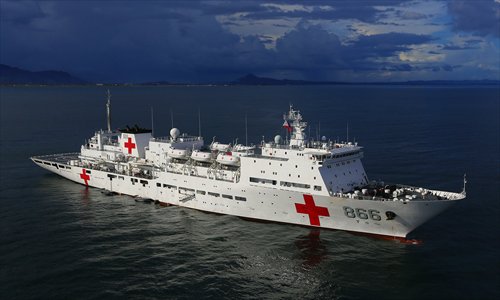
Chinese navy ship participating in the RIMPAC exercises: Peace ARK. Photo: CFP
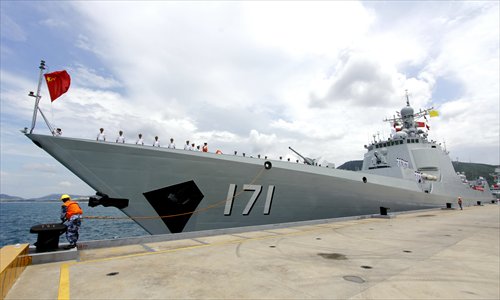
Chinese navy ship participating in the RIMPAC exercises: Haikou. Photo: CFP
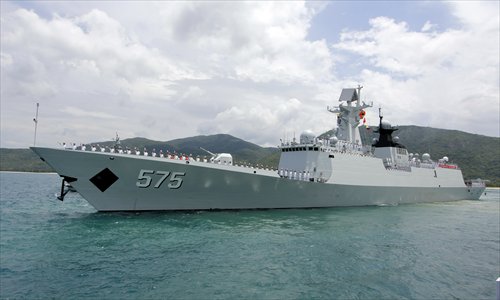
Chinese navy ship participating in the RIMPAC exercises: Yueyang. Photo: CFP
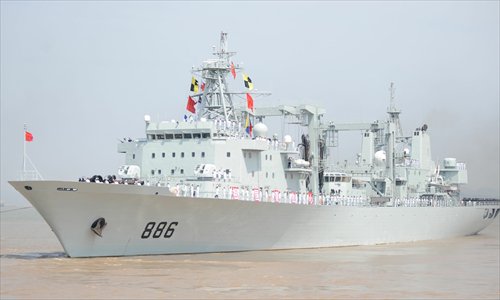
Chinese navy ship participating in the RIMPAC exercises: Qiandaohu. Photo: CFP
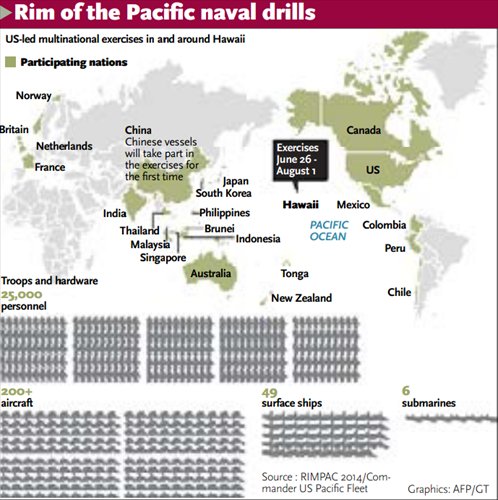
Graphics: AFP/GT
Read more in Daily Special: China joins RIMPAC naval exercise for the first time
Chinese warships are set to join the US-led Rim of the Pacific (RIMPAC) naval exercises on Thursday for the first time, a move expected to enhance understanding and help avoid unintended clashes amid growing tensions around China.
However, analysts are reluctant to be too optimistic about what the joint exercise means for China-US relations, with some believing this joint drill could still be a symbolic effort in the two countries' ups and downs.
Four Chinese navy ships, including missile destroyer Haikou, missile frigate Yueyang, supply ship Qiandaohu and hospital ship Peace Ark with more than 1,100 crew arrived in Pearl Harbor in Hawaii for the world's largest naval drills, according to the Xinhua News Agency.
This year's RIMPAC exercise, the 24th in a series that began in 1971, is scheduled to run from Thursday until August 1. A total of 23 nations, 49 surface ships, six submarines, more than 200 aircraft and 25,000 personnel will participate.
The People's Liberation Army (PLA) navy will join a fleet with the US, France, Mexico and Brunei and take part in seven programs, including artillery practice, anti-pirate sea security operations, search and rescue exercises and military medical exchanges.
Zhang Junshe, a researcher at the PLA Naval Military Studies Research Institute, said this is a good chance for the outside world to better understand the Chinese navy.
"China has sent its newest and best warships to engage in face-to-face exchanges," Zhang told the Global Times on Wednesday. "It will enhance the transparency of the Chinese navy, and help reduce 'China threat' accusations."
What is even more important is that the exchanges will reduce the chances for the two countries to misunderstand each other or make the wrong decisions in tense situations, Zhang said.
Chinese soldiers will also attend seminars and play basketball and soccer with their counterparts from other countries, according to Zhang.
Another highlight is that the two hospital ships have participated in the joint drills for the first time in 24 years. Crews of China's Peace Ark and the host's USNS Mercy will visit each other's ship and share information, according to Zhang.
The US side has touted China's first participation in RIMPAC as "a big step" in reducing tensions.
"We just have to get past these issues that are historical in nature that are causing regional problems," The head of US Pacific Command, Admiral Samuel Locklear, told AFP. "And if we keep working at it we'll get through them."
With its "pivot" to Asia policy, the US has become more active in China's territorial disputes with neighboring countries in South China Sea and East China Sea.
China has insisted that it will deal with regional disputes directly with the involved countries and does not want to see interference by a third party.
Xu Liping, a researcher of Southeast Asian studies with the Chinese Academy of Social Sciences, said Japan and the Philippines, which have territorial disputes with China and have also participated in RIMPAC joint drills, should not just rely on the US in security issues. They should also cooperate with China, Xu told the Global Times.
Military exchanges between China and the US have been on-and-off for decades. China suspended military contacts after incidents such as the 1999 NATO bombing of China's embassy in Belgrade, in 2001 when a US spy plane and Chinese fighter jet collided over the South China Sea and in other years when the US sold weapons to Taiwan.
Agencies contributed to this story